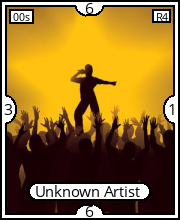How to Play
Are you ready to rock? You will be soon, after reading this. We'll get you ready for the big time in no time!
Rock Block is an online game where the greatest rock stars in music history are collected and used to compete. When you begin a virtual label, you receive five artists to start playing. Each concert in the game is a face-off between you and a rival player, with larger stakes the longer you've both been playing the game. The objective is to keep building a larger collection and to enjoy the heck out of those concerts along the way.
Artists

First, let's understand the elements of each artist. An example appears at right.
Name: Artists remain unidentified (appearing as a mysterious "Unknown Artist") until you discover them in the game, either by adding them to your label or when another player uses them against you in a concert. Each artist is a renowned rock star, with occasional crossover guests from the worlds of pop, R&B, country, electronic music, hip hop, and other genres. Any number of duplicate copies may exist of the same artist, sometimes even in the same collection. The greater the performer, the rarer their appearances in the game.
Rank: There are ten ranks of artists, with R10 being the rarest and strongest, down to the common and relatively weak R1. In the upper-right corner, you can see that this artist is Rank Four.
Decade: Every band has a heyday, even the lifelong stars. The decade in the upper-left corner (2000s in this case) is the decade of their breakthrough as a major artist in the public consciousness, and thus the decade with which they are most closely associated. Some solo artists may have previous been famous as band members, but their decade reflects their first major success as solo artists.
Sides: Each artist has four numbers representing the four sides. These are referenced clockwise from the top. In the example at right, the sides are 6 1 6 3. The higher the rank, the greater these numbers are, and the stronger the artist will be in concert. Sides normally cannot go higher than 9, except for R10 artists which can achieve 10 on a side.
Color: Your label's color is unique, and will distinguish your artists from your opponents'. Choose a unique color, or just go with your favorite. In the sample at right, the artist is framed in white.
Sometimes, at irregular intervals, existing artists are promoted to higher ranks. This is done to maintain a balance as new performers are gradually added to the game. All players who have a promoted artist will see its effects right away, but any open concerts using the promoted artist will finish with the numbers at the same level they were when it started. Over time, promotions makes it possible for artists to rise to greater levels than their initial introduction, allowing yesterday's weak R1 to become today's beefed-up R5 and tomorrow's supreme R10.
Concerts

Every concert is a "battle of the bands" between two players, each of whom brings five artists. Concerts are played out on the stage shown at right, which is separated into nine areas, from "Upstage Left" to "Downstage Right."
The player who initiates a concert is called the challenger, and the person they ask to play against is the defender. When a challenge is issued and accepted, each player chooses five of their artists, and the match begins. Once a concert has started, it can only end in a win, loss, or draw for each player.
The defender goes first, playing one of their five artists to one of the nine sections of the stage. The challenger goes second, and the rest of the concert is a series of alternating turns between them.
When you play an artist next to one of your opponent's, you have an opportunity to capture that artist and convert it to your color. On the sides that touch, if the number on your artist is greater than the number on the other artist, the other artist will switch to your color. A well-played artist can capture up to four adjacent artists around it!
Example: Capturing an Artist

Your opponent's artist has a 3 on its bottom side, and nothing below it.

In the open space, you play an artist with a 4 on its top side.

Since your 4 is greater than their 3, you capture the other artist!
The winner of the concert is the player with more artists in their color when the stage is full, out of the ten that the players started with. The remaining unplayed artist counts towards the totals. Concerts that end with a score of 5 to 5 are called draws and have no winner or loser. The winner will receive a new artist as a prize (see below), expanding their collection. Also, depending on the trade rule in use (see below), the winner might take some of the loser's artists. A draw is worth a half-credit towards a new artist for each player.
To start playing against someone, visit the Start a Concert page. This form offers a full menu of options available in the concert. As you begin to make choices, the form will gradually shrink as some options are eliminated, making it easier to easier to finish. (For instance, if you choose an opponent who is new at the game, some of the advanced play rules that this player has not yet earned will disappear.) When you're done, just hit submit to initiate the challenge. Your opponent will have a chance to accept or decline the challenge and to choose their own five artists to bring.
Time limit: Each player has one week to make their next play in every open concert. Failure to play within the time limit results in a forfeit, which is an automatic win for the opposing player. The winner also has one week to claim the loser's artists after the match before the opportunity passes.
Theme: Some concerts have a special theme, such as a single geographic area or a single sub-genre of rock music. These are played the same as regular concerts and carry the same rewards for victory, but they have fixed rules and only certain artists are eligible.
Automatic concerts: In addition to most concerts that are initiated by players, the website will automatically begin concerts on a regular basis, featuring randomly chosen elements. To opt out of future automatic concerts, visit the Options page. (You can opt back in any time.)
Trade Rules

A concert's trade rule determines how many artists the winner will take from the loser as a trophy. Only the artists brought to the concert are vulnerable. Beginning players must win a concert before they can risk artists in battle this way, so if you're still new, don't worry about the stakes just yet. Matches that end in a draw do not exchange artists, except with the Each trade rule.
As you defeat more opponents, you'll gradually unlock more complex trade rules that let you claim even more artists in victory. The "Rules" section of the page for your label will have more information about unlocking further trade rules.
As long as you're playing with the None trade rule that risks no artists in defeat, you can re-use your artists in as many simultaneous concerts as you wish. However, when you play with any other trade rule, the five artists in that concert will temporarily become unavailable in other new concerts, to prevent a conflict if multiple opponents defeat you at once.
Play Rules
The spice of the game are the play rules, optional terms of battle that can turn ordinary concerts on their head. Use these rules to pull off combination attacks, capture artists on the other side of the stage, make your artists invincible, and more.
Like trade rules, you learn more play rules the longer you keep playing and winning. Unlike trade rules, you can set as many different play rules per concert as you want, creating a different experience every time. The "Rules" section of the page for your label will have more information about unlocking further play rules.
Collecting New Artists
Every victory in concert earns you another R1 artist, and every two draws earns you another R1 artist. You can claim this reward right away, or wait and earn a second victory to turn it into an R2, or a third to turn it into an R3, and so on. You must have a certain number of artists at lower ranks before you can begin to collect artists at higher ranks. Visit the Collection Guide to claim these new artists at any time.
There is also an option to convert artists: On the Collection Guide, you'll have the opportunity to convert one of your artists into another artist of the same rank. You must have multiple copies of the artist that are not tied up in trade concerts, and you must have discovered (and not have already) the artist that you're getting. The conversion will cost you ranks of new artists that you earned by winning concerts, ten ranks for every one rank of the artist being converted; for example, to convert an R3 into another R3, it would cost you 30 ranks of new artists.
Rock Blocks

The single highest achievement in the game is a rock block, which is to capture all nine spaces on the concert stage in your color.
Besides the normal benefits of victory, your reward for pulling off a rock block is that one of the artists in your collection will sign an exclusive contract with you. You'll suddenly have the only copy of that performer in the whole game; any other existing copies (including your own duplicates) will vanish from existence. Other players cannot get any copies of this exclusive artist, unless you risk yours in concert.
The exclusive deals that come with rock blocks are a great way to treasure your most favorite performers and to tick off your rivals at the same time, but they don't last forever. In order to keep your exclusive artist, you'll have to risk it in battle every six months, or it will revert to normal (non-exclusive) status. If another player does take it from you in battle, it stays exclusive to them, so you'll have to schedule a rematch if you want it back.
If another player signs an exclusive with an artist in your collection and it vanishes, you can receive free replacements, either one artist of the same rank or several artists adding up to that rank. Visit the "New Artists" section of the page for your label.
Gameplay Tips
Don't be discouraged by the complexity of the game when you begin. As long as you understand the basics of the artists and the concerts, you'll do just fine. The game is designed to expose its advanced elements to you only gradually, so that you only need to learn the basics when you begin.
In concert, different strategies work better for different combinations of play rules, but the safe bet is to diversify your hand: Choose artists so that you'll have at least one high number on each of the four sides, so that you can potentially capture any performer on the stage.
Playing defensively isn't glamorous, but it wins some matches and can keep you out of trouble. For example, one trade rule grants the winner more artists depending on how many captures she or he achieved during the match; if your match with this player is heading towards a loss, stop trying to capture more performers and focus on defensive positions that will reduce the number of artists that your opoonent captures from you.
If you're challenging a player because you want a shot at one of the fancy rare artists you've seen in their collection, don't be shy about saying so in your comment.
If your collection of artists gets depleted, don't get discouraged. The game is programmed to keep you from losing more artists than you would need to keep playing. If you label grows small, you can always acquire more in the "New Artists" section of the page for your label, rebuild your collection, and come back for more.
Play fairly. The balance between players depends on all players earning their way into larger collections and new achievements. Making agreements with other players to lose on purpose, creating ghost accounts to manipulate outcomes, and other form of dishonest play are not welcome. Scott Hardie, the game administrator, will take whatever actions are necessary to preserve fairness in the event that cheating is discovered.
If you still have questions, you are invited to contact Scott Hardie any time for more information. Play courteously, play wisely, and have a lot of fun doing it. For those about to rock, we salute you!





